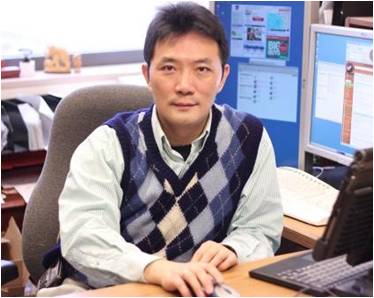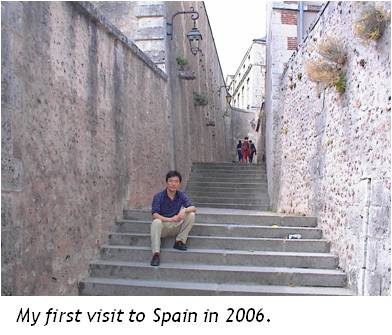Interview with Zhi-Li Zhang, Visiting Researcher, Institute IMDEA Networks
1. To begin this interview, we are curious about how you were called to the life of science. When and why did you decide to become a scientist?
 It probably started in the junior high school when I first studied Euclidean Geometry. I was fascinated by the logical and rigorous ways of reasoning used in Euclidean Geometry, where one starts with a few simple statements that are taken as true (“axioms”) and derive other truthful statements by applying a series of simple logic rules. If one accepts the axioms and the rules of logic, there is no argument as to what is true and what is not (well, later on in college I learned that, in fact, things are not as simple as that!). In high school I encountered “Mathematical Induction” --- another powerful way of reasoning in mathematics, where by following two “simple” steps, one can prove a statement holds true not only for a finite number of items, but for an infinite number of them! Logic rules and mathematical induction (computer scientists use a more fancy term for it, “recursion”) are in fact the foundation of modern computers. My early interest in mathematics thus naturally led me to the field of computer science, which in a sense is a modern branch of mathematics.
It probably started in the junior high school when I first studied Euclidean Geometry. I was fascinated by the logical and rigorous ways of reasoning used in Euclidean Geometry, where one starts with a few simple statements that are taken as true (“axioms”) and derive other truthful statements by applying a series of simple logic rules. If one accepts the axioms and the rules of logic, there is no argument as to what is true and what is not (well, later on in college I learned that, in fact, things are not as simple as that!). In high school I encountered “Mathematical Induction” --- another powerful way of reasoning in mathematics, where by following two “simple” steps, one can prove a statement holds true not only for a finite number of items, but for an infinite number of them! Logic rules and mathematical induction (computer scientists use a more fancy term for it, “recursion”) are in fact the foundation of modern computers. My early interest in mathematics thus naturally led me to the field of computer science, which in a sense is a modern branch of mathematics.
2. What training and background do you have as a researcher?
After obtaining my B.S. degree in Computer Science in China, I was awarded a government fellowship from the Chinese Ministry of Education for graduate study in Denmark. I did research in complexity theory, which addresses the fundamental questions in Computer Science, such as what kinds of problems computers can solve efficiently. After about three years study, I got a chance to visit Carnegie Mellon University in the United States for 6 months. I really enjoyed the dynamic and competitive graduate research environment in the US. So I decided to transfer to the University of Massachusetts, Amherst to continue my Ph.D studies. There I met my future Ph.D advisors, Prof. Don Towsley and Jim Kurose, who got me interested in networking research. That was in the early 1990’s, when the World Wide Web had barely been invented by Tim Berners-Lee at CERN a couple of years ago, and before the Internet boom began. I was lucky doing research in the networking area just as the Internet was beginning to take off. My Ph.D studies focused on how to provide better quality-of-service on the Internet and how to support multimedia (such as voice and video) delivery over the Internet. After obtaining my Ph.D degree, I got a faculty position at the University of Minnesota in 1997. I have been there since, for nearly 15 years! While being a professor at Minnesota, I have had numerous opportunities to collaborate and work at industrial research labs and other universities for both short-term (1-3 months) and long-term (6 months to 1 year) visiting positions. These include AT&T Research Lab, IBM T.J. Watson Research Center, Narus Inc., Sprint Advanced Technology Lab, Miller Institute for Basic Sciences, and University of California, Berkeley.
3. How did you get the opportunity to come and work in Madrid? What institutions have you been connected to so far?
 Together with Prof. Arturo Azcorra at UC3M (Universidad Carlos III de Madrid), I co-chaired the IEEE INFOCOM conference – the premier conference in telecommunication and networking research – which was held in Barcelona, Spain for about a week in April, 2006. After the conference, Prof. Azcorra invited me to visit UC3M. That was the first time I set foot in Madrid. Later on, I served on the Scientific Advisory Board for IMDEA Networks from its groundbreaking until 2010.
Together with Prof. Arturo Azcorra at UC3M (Universidad Carlos III de Madrid), I co-chaired the IEEE INFOCOM conference – the premier conference in telecommunication and networking research – which was held in Barcelona, Spain for about a week in April, 2006. After the conference, Prof. Azcorra invited me to visit UC3M. That was the first time I set foot in Madrid. Later on, I served on the Scientific Advisory Board for IMDEA Networks from its groundbreaking until 2010.
4. What interested you most about the IMDEA project? What made you want to become involved?
As you can see from above, I have been involved with IMDEA Networks since its very beginning. I have seen it grow to a now renowned research institution in Spain and Europe, with many top-notched researchers and talented students working on the frontiers of networking research.
5. In what research lines will you be working? What specific results do you expect to see?
There are a few lines of research that I am very interested and plan to work on. These include understanding the design and development of large-scale content distribution systems such as YouTube, the socio-technological interplay on the evolution and future development of such systems as well as the Internet at large. In addition, I am interested in investigating the economic implications of such systems on the design of future network architectures. In any case, these are my first weeks here, so I am still talking to the researchers and graduate students. With all the talents at IMDEA Networks, I am confident that we will be able to obtain some interesting and exciting research results.
6. Did you know Spain before joining IMDEA? What do you like best about Madrid?
Yes, this is my fourth time visiting Madrid. But all the previous times, I only stayed for a very short time period, and did mostly the typical tourist things. This time I will get a chance to get to know and live in Madrid. In the weekend, I walked around the neighborhood that I will be living in for 6 months. I really love the narrow streets and city squares that are bustling with shops and people. Unlike most cities in US, Madrid is a true city where people actually live in!
Read more:
 Download Press Release (250 Kb)
Download Press Release (250 Kb)
Madri+d notiweb (in Spanish)

